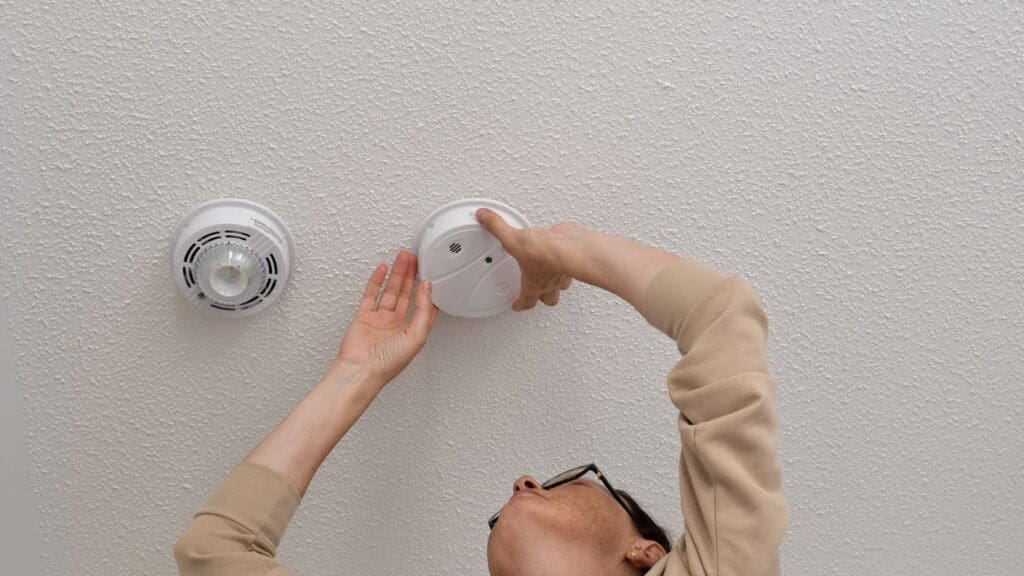
When it comes to protecting your home in Gymea, smoke and heat alarms aren’t just gadgets, they’re lifesavers. Fires can take hold in under three minutes, and thick smoke can render someone unconscious before they even realise there’s a problem. Knowing the difference between smoke and heat alarms, understanding what’s legally required, and following best practices can make all the difference in keeping your family safe.
Difference of Smoke and Heat Alarms
Both smoke and heat alarms detect fires but in very different ways, each with a unique purpose.
Smoke Alarms: Uses photoelectric sensors to detect smoke particles. They’re designed to alert you early, especially in smouldering fires where smoke is present but flames might not be visible yet. Ideal for bedrooms, hallways, and living areas, smoke alarms can sometimes be triggered by steam, dust, or cooking fumes, which may cause false alarms.
Heat Alarms: Detects rapid rises in temperature. Less sensitive to airborne particles, they’re perfect for areas like kitchens, garages, and bathrooms—places where smoke alarms could be triggered unnecessarily due to steam or fumes. Heat alarms respond only when actual fire generated heat is detected but don’t provide the early warning that smoke alarms do.
Together, smoke and heat alarms complement each other to provide more complete protection across your home.
What’s Legally Required in NSW?
NSW law requires every home to have at least one working smoke alarm on each level, meeting national safety standards to ensure they reliably alert you in the event of a fire. This applies to all residential properties, whether owner occupied or rented.
Homeowners and tenants share responsibility for keeping alarms in good working order. Alarms must remain installed and operational at all times, with batteries replaced as needed. In rental properties, landlords are responsible for installing smoke alarms before the tenancy begins, while tenants are expected to maintain battery replacements during the tenancy.
Failing to comply can result in fines and, more importantly, puts lives at risk.
Best Practice
While the law sets the baseline, Fire & Rescue NSW recommends going further by installing interconnected smoke alarms in every bedroom, living space, hallway, stairway, and garage.
Interconnected alarms mean when one detects smoke or heat, all alarms sound at once. This early, whole home alert is crucial, especially in the multi-level homes common in Gymea, where fire and smoke can spread quickly.
Insurance and Compliance
Having working smoke alarms isn’t just about following the law, it can also affect your insurance and financing. Many home insurance policies and lenders require proof that your smoke alarms are installed and functioning properly. Without compliance, you could face denied claims or trouble securing loans. More importantly, meeting these requirements means your home and loved ones are better protected from the devastating effects of fire.
Maintaining Your Alarms Systems
Installing smoke and heat alarms is only the first step, regular maintenance ensures they’ll perform when it counts. Test your alarms monthly by pressing the test button, replace batteries as needed, and keep sensors clean from dust and debris. It’s also important to schedule a professional inspection at least once a year.
All smoke alarms have a 10-year service life, and will be marked with either the date of manufacture or a date of expiry. Mains powered smoke and heat alarms have a backup battery that allow them to protect your family and your home during power outages. Smoke alarms and heat alarms are now available with a 10-year backup battery. Replacing old alarms with this 10-year type reduces maintenance requirements as well as used batteries entering the waste stream.
Proper upkeep not only prolongs the life of your alarms but also gives you confidence that your family is protected around the clock.
Trusted Fire Safety Solutions
Whether you’re setting up new alarms, upgrading to interconnected systems, or booking regular maintenance, Absolutely On-Time Electrical provides reliable, tailored solutions to suit your home’s layout and ensure full compliance with NSW regulations.
We know fire safety is about peace of mind, that’s why we specialise in the expert installation, maintenance, and replacement of smoke and heat alarms throughout Gymea. From first time installs to safety checks and battery replacements, our licensed electricians are committed to keeping your home and family protected.
Don’t wait until it’s too late, having the right alarms in place is one of the smartest decisions any homeowner can make.
